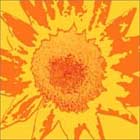
The confusion of Oneida's mission in life increases and reaches mental-institution levels on Each One Teach One (Jagjaguwar, 2002). Sheets of Easter opens the proceedings simply repeating for 14 minutes the same (virulent) riff, vocals and drumming (a sort of Sister Ray for the mentally handicapped, or imagine a merging of Suicide's Ghost Rider and Amon Duul's Phallus Dei). The 16-minute Antibiotics is another frantic, repetitive bacchanal, in which a syncopated, acid organ riff collides against a distorted guitar-driven jam. The guitar and the organ occasionally turn the volume up, but mostly they play the same notes over and over again (the last seven minutes are completely different, a cosmic-psychedelic fugue a` la Pink Floyd's Astronomy Domine, but they sound like a gratuitous appendix).
The other seven tracks return to the song format, although hardly to friendly sounds. The scratching/shrieking guitar solo and the insistent boogie rhythm of Each One Teach One bridge the artsy propensities of the longer tracks and the garage-rock underpinning of the shorter ones. A techno beat and an exotic melody propel the hyper-distorted pow-wow of People of the North, the most Suicide-like track on the album, further derailed by harsh industrial and cosmic dissonances. The demented litany of Number Nine harks back to the Beatles' Magical Mystery Tour, despite an invasive sitar line. Rugaru is a dadaistic ballet for androids that growl to the moon. And the closing No Label is its melancholy, apocalyptic counterpart, a mournful march through a nuclear wasteland.
The overall effect of the album is harrowing.


